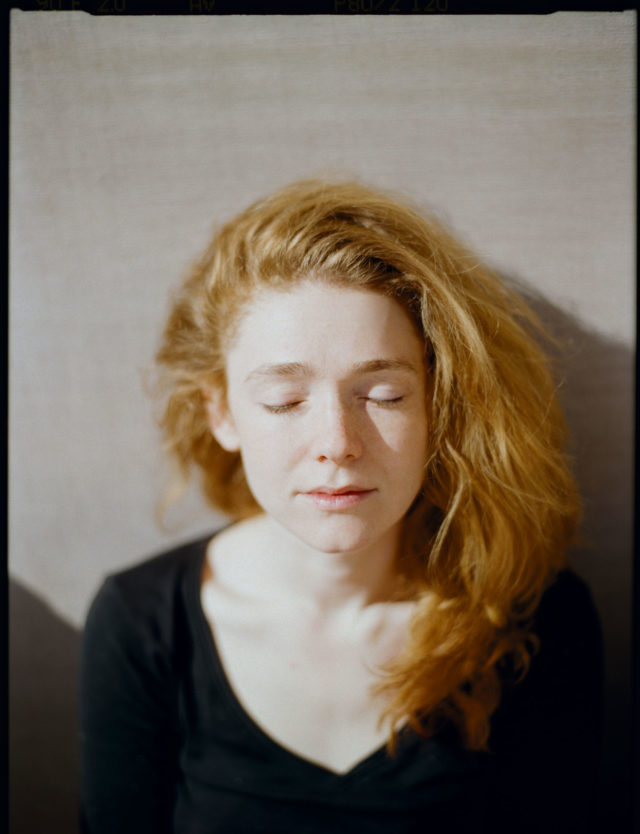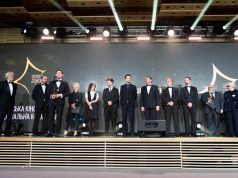Since she first appeared in the 2013 cult hit “My Mermaid, My Lorelei” under the legendary Georgian director Nana Jorjadze, Kateryna Molchanova has quickly become one of Ukraine’s best known actresses. An Odessa native, the actress has garnered critical praise as well as popularity with the Ukrainian film going public. The Odessa Review caught up with the starlet over coffee to discuss her newest film ‘My Grandmother, Fanny Kaplan’. The Film is slated to be screened as part of the national competition at the Odessa International Film Festival.
The Odessa Review (Regina Maryanovksa – Davidzon): Katya, recently you represented Ukrainian cinema in Ireland. Tell us about your impressions of that festival. How did the Irish react?
KM: They had an awesome reaction! They are very friendly people. I was worried that I would not be able to understand their accent, but I soon became accustomed to it. I simply had to! There were master classes led by casting director Debbie McWilliams and several others, and I simply could not afford to miss what these very smart people were teaching me – I trained my brain to understand the Irish speech. Even the cinematic jargon! It was excellent – there were many young stars!
OR: What did you learn from the master class?
KM: Today, the use of video auditions is growing. Earlier, in Europe there were only a few Russian-speaking actors, and they were constantly used in the same kinds of roles. But, now casting directors have more options – they can use the internet to find actors whom they can invite to work with them. In Ireland, I met an actress from Moscow – she was getting ready for an audition in London, where she had to portray a Ukrainian accent in English. Along with some Ukrainian-speakers from the USA, we tried to help her. She auditioned through video and then traveled to London. I also got some video auditions, thanks to this festival. I told everyone there my “how I got into film” story.
OR: Tell us about ‘Fanny Kaplan’. When will we be able to see it?
KM: I have asked about the premiere many times…my friends have told me – “wait, pray, and dream”. In the past, you would go around offering your film to various festivals, now the selectors come to you and decide if they want you. The movie itself is very strong and coherent.
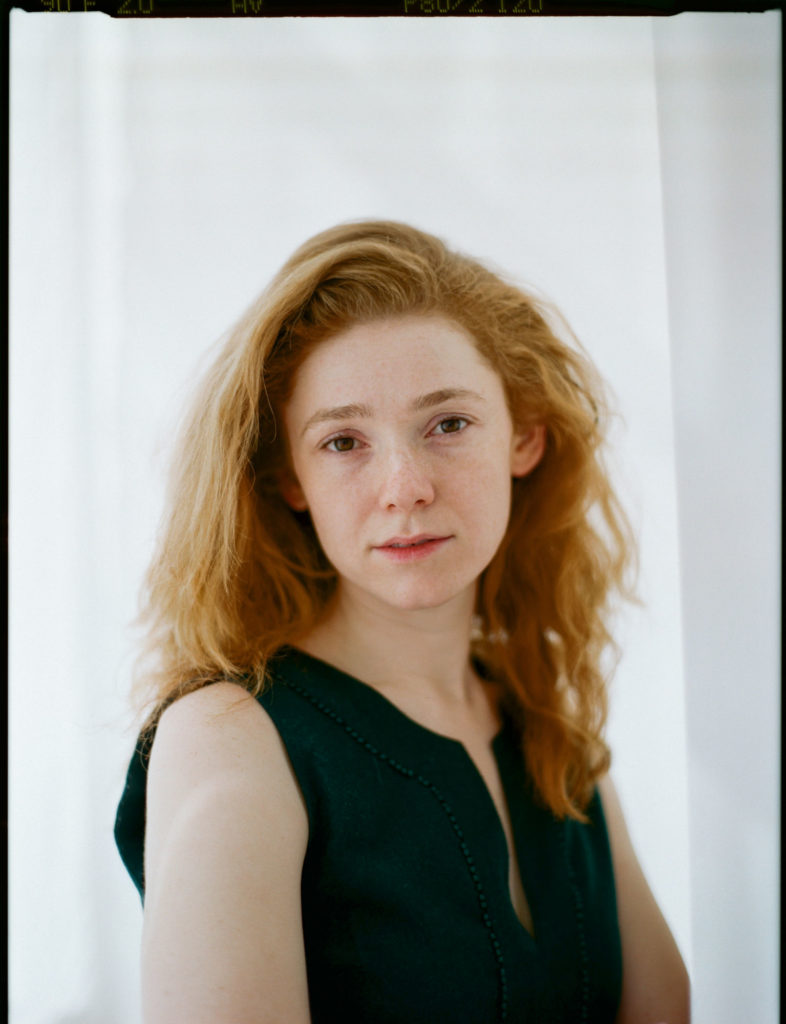
OR: Will there be a premiere in Odessa?
KM: Yes, as part of the Odessa International Film Festival (OIFF). The OIFF is the best platform for premiering a Ukrainian movie. Besides, premiering your movie in your native city is just a great feeling.
OR: What did you think of Myroslav Slaboshpitsky in the role of Lenin’s brother?
KM: I didn’t know him before this film. The script called for an ‘unattractive, fat man’. So Slaboshpitsky comes in. At that time, he wasn’t a Cannes laureate yet. He was just a regular actor who came to the auditions, like me. For the audition, he and I had to do a sex scene together…a strange audition piece, but I suppose it was important to the film. During the auditions, the news surfaced that Cannes put “The Tribe” into its competition. At the second round of auditions, we learned that he is going to Cannes and that this will affect the filming schedule. After Cannes, where he was a huge success, he was constantly on the phone in between shots giving interviews. It was amazing – we were all happy for him. I even met his father on set once. I’m happy that I got to know Mirek before the whole Cannes business – our relationship was authentic and warm.
OR: Was it more difficult to work with Miroslav or Oleg Skripka?
KM: That’s a good question. It was more difficult with Skripka, because it was harder for me to understand how to react…well, it was easy to work with both of them, but if I had to make a choice I’d say Skripka. They are very different. I think maybe it was more difficult because Oleg Skripka was one of my childhood idols, so that altered my approach to him. But it turned out that he is a very calm and interesting person, a good communicator.
OR: For both of the films in which you had leading roles, the directors were women.
KM: Yes! And not only in those films. The only male director I have ever worked with is Vasyanovich.
OR: Have you ever wondered why that is?
KM: I have asked myself that question. At first I thought that I was simply the “type” female directors sought out, and that it was easier for me to find common ground with women. I’ve had this conversation with a Ukrainian producer and a female director. The producer said that in 8 out of 10 of his projects the director is female. The director also said that in her film school days, most of her classmates were other women. Maybe part of it is that directing has ceased to be a “breadwinning” job, so men are less attracted to it.
OR: However, it still seems that most Cannes attendees are male, does it not?
KM: I think that would be a question for the committee. I haven’t really thought about it. Every director is a completely different person with different approaches. Right now I am preparing for another short film with Katya Gornostay about five girlfriends – and we all have really hung out, had a ladies’ night. That’s how we prepared…method acting! The last Odessa International Film Festival also had two winners in the Ukrainian program – Katya Gornostay with “Aloof” and Marina Stepanskaya with “A Man’s Work”.
I don’t think directing brings substantial earnings anymore…this is why I think that men, if they want to support a family when going into film would prefer to be producers or on the financial side. Or maybe in television – series, sitcoms.
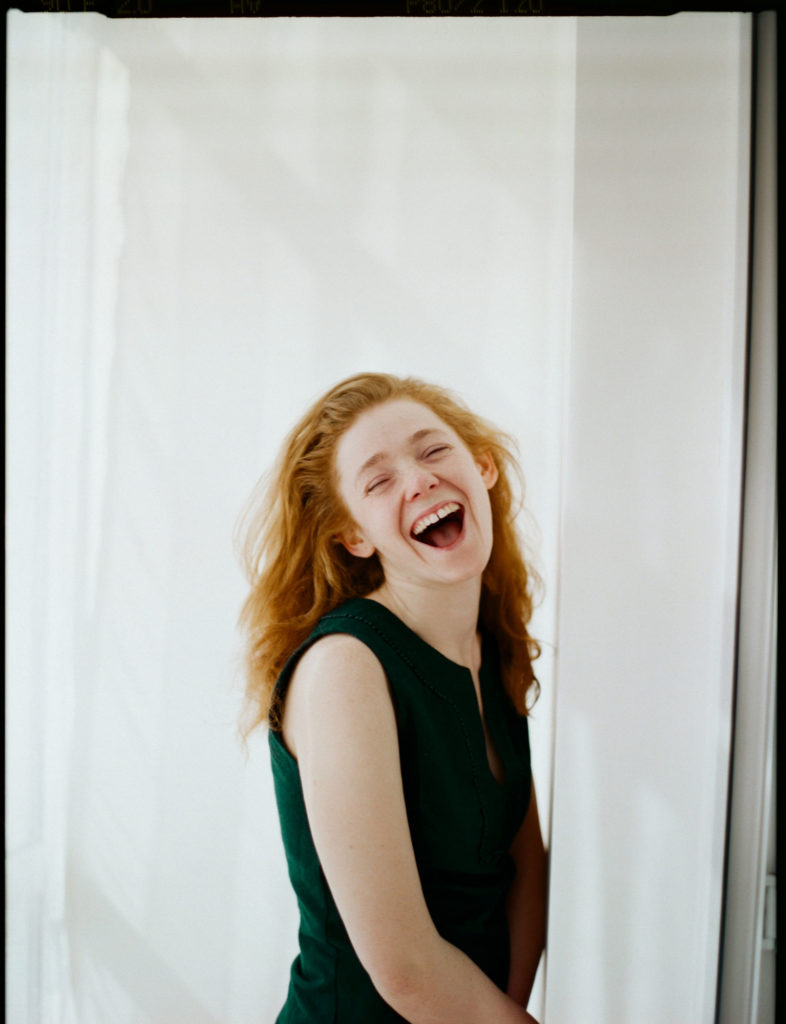
OR: Which director would you most want to work with?
KM: Sofia Coppola.
OR: Another woman?
KM: I just thought, “Which other woman is interesting to me? Oh, Sofia”. Anya Melikyan as well, she and I intersected in Ireland. From the male directors, Zvyagintsev, Ivan Vyrypaev, Ivan Tverdovsky, Popogrebsky. They are all Russian directors, bright, young guys.
OR: What if fate makes it so that Michael Haneke comes to Cannes this year and sees the Ukrainian short film starring you, and wants you to become the new, Ukrainian Isabel Huppert?
KM: I’m very embarassed, but I haven’t seen any of his films besides “Love”. I don’t think I even watched that movie to the end – it was too painful for me. Too close. Well, if that happened…it would be great! Why not! What a dream!
OR: What about Zvyagintsev?
KM: Well, Zvyagintsev’s films tend to be very dark as well. I tend to enjoy lighter subjects. After “Fanny Kaplan”, I was asking myself, maybe I should work in comedy now? I have the desire to work, and if a director is able to bring his project close to completion, that means he knows what he is doing and more than likely has at least some talent. Bad material is unlikely to find financial backing. Recently I had an offer for a strange project…but I refused, it was too dark.
OR: What reason could cause you to refuse to work with a director?
KM: If I am unable to understand what he is trying to say.
OR: In the case you mentioned, were you unable to relate to the role?
KM: No, it was just too heavily involved in politics and religion. Too specific of a theme for me. Although, the directors are very interesting and pleasant people, I am sure that they will eventually succeed with this project.
It’s like this…sometimes someone tells a joke, and you sit there thinking, is that really a joke? It should be funny, but tears are welling up…
I also often refuse to do commercials.
OR: Would you describe yourself as a drama actress?
KM: That’s the way it seems to have been unfolding thus far. Sometimes I want to do something easy…something that doesn’t leave a heavy feeling in the soul. Like “Mermaid” – that was a light, happy movie. After “Fanny Kaplan”, I want to work on something light.
OR: What was it like, starring in “Fanny Kaplan”?
KM: It was difficult. Reading the script, I was thinking to myself, “how am I going to be able to do all of this?” It helped that there was a break, and the more demanding, emotional scenes were left for the second stretch of filming. We had to wait a year for funding. During that time, I had the opportunity to get into those scenes, think them through, live them…it all added up. When it was time to film, I was ready.
OR: How do your friends and family feel about your career?
KM: They are happy for me. Proud. I’m still my old self to them. When I give them news about a new film project or festival, I think it’s already more normal for them than it is for me. I don’t believe I have some great degree of success, and I am ok with that. I want to work – but only in quality films.
OR: On the topic of fame, you say people have started recognizing you…that is a measure of fame!
KM: Well, maybe once every two weeks somebody recognizes me on the street. If that’s fame, so be it! My old friends, who knew me before all this, they are happy for me anyway.
OR: Regarding students, do you always agree to play in student short films?
KM: No, I have to read the script, watch what they have made before…I have to see if the person has potential before I agree to anything. If the material is good, from an ambitious young director – then why not? It’s a win-win situation, I think. I worked on two student film projects, and I learned a lot from both. You get something out of each role. There are 20 year olds who are able to create these divine films, come up with incredible ideas, one of a kind scripts – because they lack fear! It’s the insolence of youth. It’s even sometimes hard for me to obtain a visa – but these kids find a way, get grants, they travel and film. It’s amazing! They don’t even need a lot of money – they’re happy with a small budget. With these miniscule resources, they are able to get out there and represent the country! I’m always happy for our young directors, and I have nothing against working with them – because I know that they will grow, and I will grow with them. Give it time – the world will hear all about our young Ukrainian cinematographers!
OR: So, do you believe Ukraine has a chance to become a part of the new wave of European cinema – similarly to when there was a burst of Romanian cinema, when Romanian directors staked out a spot for themselves at international festivals.
KM: Yes, I think Ukraine will blow the competition away! Especially if film budgets somehow increase, money starts coming from somewhere. In this sense, I am an optimist!
OR: Most of Ukrainian cinema is small-budget, correct?
KM: You could make a film with 5 thousand Hryvna, or you could make one with 200 thousand. Both are considered small budgets. We filmed a social project with students – just for free. With renting a space, the basic equipment…it’s very easy to rack up a thousand US dollars just for one day of filming.
OR: What are your plans now? Are there any offers? Maybe some options from Ireland?
KM: I prefer not to sit around and wait – I keep working. I heard someone say a very wise thing recently: “If you’re standing at the station waiting for a train and it doesn’t come, why worry? You did everything that depended on you in order to get on the train. Just be ready for when it comes”. So I try to be ready for when the train comes, so to speak.
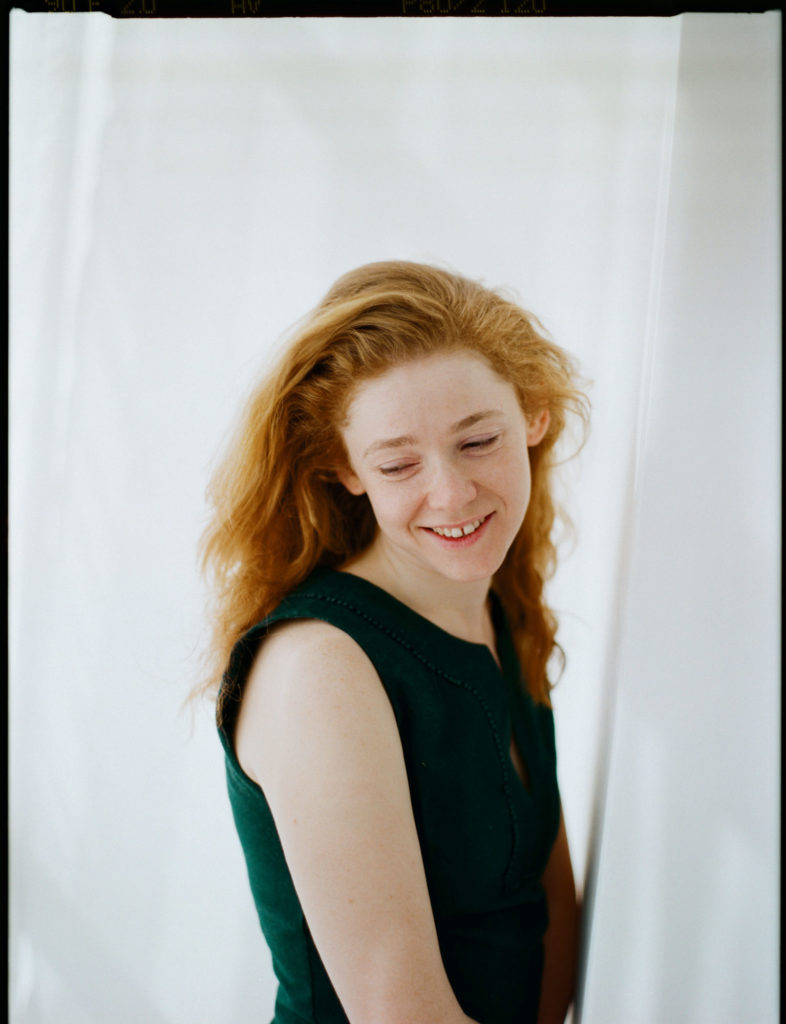
OR: What does Odessa mean to you?
KM: My home. When I get back from Kyiv, I open the car door and the first thing I hear is the sea…it’s beautiful.
Kyiv is modern. The public transport system is new, the streets get cleaned…when I get back to Odessa after being in Kyiv, sometimes I feel hurt that our city isn’t taken care of like that… but now for example, they are doing things like restoring the Green Theatre, which is great.
OR: Have you ever wanted to try theater acting?
KM: I hate this question! No, I don’t see myself in theater at all! I don’t want to try. There are some people who are truly meant for that – it is wonderful to see them on stage. I would not want to insult the talented actors working in Ukrainian theaters, but the times I have seen this kind of true amazing talent have been rare. I think some actors are meant for film only. Perhaps, one day, if there is the right material and a director that believes I would be right for the part, I might try it.
OR: When you think about your future career in Ukraine, do you think it is better to improve your Ukrainian or to learn English in order to focus on the English-speaking audience?
KM: One thing I learned from the Irish and English master-classes – achieve success in your own country first. This is exactly what I am trying to do right now. I get interviewed, people introduce me as an actress, people tell me that they’ve googled me, seen this or that trailer, read my interview…it gives you some impression of importance. But then when you arrive to the auditions, you’re just like everybody else – everyone there is equal.
What my aim is…it’s very hard to meticulously plan out your career here, try to stick to some schedule or graphic. The very story of how I entered the cinema business is proof of how unpredictable it is in Ukraine – I don’t bother with planning.
OR: What is your dream?
KM: To do what I love and to be surrounded by people I love – and for them, in turn, to have everything they want. I am a very introspective, family-oriented person.
Photos by Dasha Svertilova




























